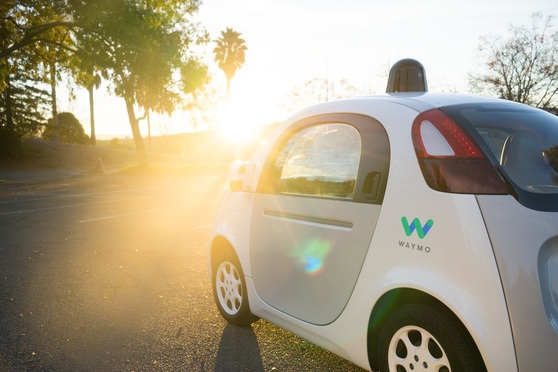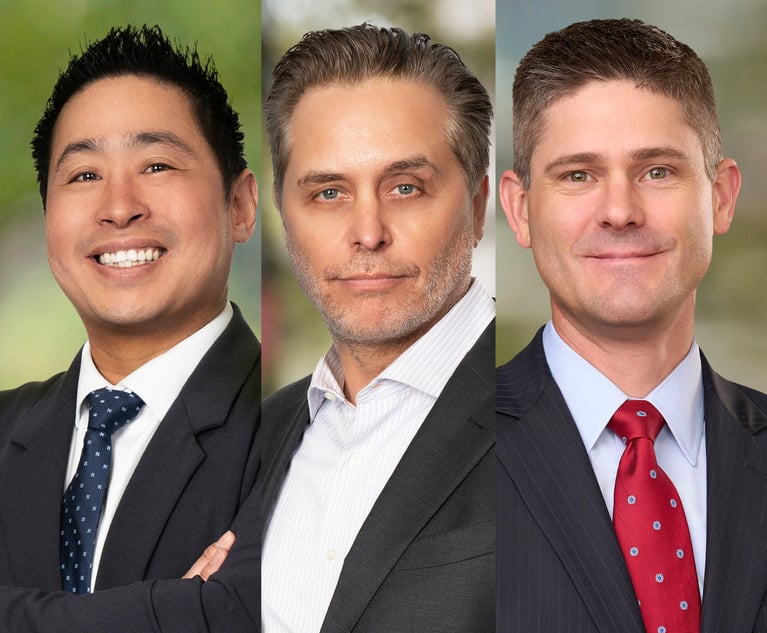2 Proposals Open Door to Free Driverless Testing Programs
If the pilot programs are approved, the utility commission will begin crafting "a broader framework" allowing companies to accept paying passenger.
April 06, 2018 at 07:02 PM
4 minute read
 A Waymo driverless car. Courtesy.
A Waymo driverless car. Courtesy. Autonomous vehicle companies could start offering free test rides to the public later this year under one of two pilot programs proposed Friday by the California Public Utilities Commission.
The other test program would authorize free autonomous vehicle rides in cars with a trained driver behind the wheel. Both pilot programs must be approved by the full commission.
“These proposals allow the introduction of AVs into passenger service to the public on a pilot basis, while providing for the safety and consumer protection of the passengers, consistent with the commission's regulation of private passenger-carrying transportation entities,” PUC Commissioner Liane Randolph wrote in the 44-page document.
If the pilot programs are approved, the PUC will begin crafting “a broader framework” allowing companies to accept paying passengers in their autonomous vehicles, according to an agency statement.
As the proposals were released Friday afternoon, the Department of Motor Vehicles confirmed that it has received an application to test autonomous cars without a driver on state roads. The application period opened on Monday after regulations, under review for months, were enacted.
DMV spokeswoman Jessica Gonzalez said the DMV won't release the name of the company seeking the testing permit until the agency determines the paperwork is complete. That could happen as soon as April 12, she said.
Fifty-two companies held permits to test “drivered” autonomous vehicles as of April 1, according to the DMV. No company is permitted in California to transport passengers, although some have taken reporters and government officials for test rides. Waymo has offered free test rides to passengers in Arizona since last year.
At the time Randolph wrote her order, only two companies, Lyft Inc. and Uber Advanced Technologies Group—Uber's autonomous testing arm—had obtained both an autonomous vehicle testing permit from the DMV and a transportation charter permit while listing driverless cars as part of their fleets.
Uber has since announced it would not renew its DMV testing permit, which expired on March 31. The company suspended testing nationwide after one of its cars operating in autonomous mode struck and killed a pedestrian in Tempe, Arizona, on March 18.
A Lyft spokeswoman did not respond to a message seeking comment.
Both pilot programs would require companies to comply with certain restrictions.
All cars in the program would have to be road-tested for at least 90 days before accepting passengers. Airports would be off-limits. Permit holders would have to report all communications between passengers and the vehicles' remote operators and to submit publicly available data to the PUC every month. Every car would also have to comply with the DMV's safety and operations rules.
The commission is scheduled to vote on the program proposal on May 10.
The proposals are posted below:
This content has been archived. It is available through our partners, LexisNexis® and Bloomberg Law.
To view this content, please continue to their sites.
Not a Lexis Subscriber?
Subscribe Now
Not a Bloomberg Law Subscriber?
Subscribe Now
NOT FOR REPRINT
© 2025 ALM Global, LLC, All Rights Reserved. Request academic re-use from www.copyright.com. All other uses, submit a request to [email protected]. For more information visit Asset & Logo Licensing.
You Might Like
View All
White & Case KOs Claims Against Voltage LLC in Solar Companies' Trade Dispute

Goodwin Procter Relocates to Renewable-Powered Office in San Francisco’s Financial District

Polsinelli Picks Up Corporate Health Care Partner From Greenberg Traurig in LA

Perkins Coie Lures Former Longtime Wilson Sonsini Tech Transactions Partner
Trending Stories
- 1Decision of the Day: Judge Dismisses Defamation Suit by New York Philharmonic Oboist Accused of Sexual Misconduct
- 2California Court Denies Apple's Motion to Strike Allegations in Gender Bias Class Action
- 3US DOJ Threatens to Prosecute Local Officials Who Don't Aid Immigration Enforcement
- 4Kirkland Is Entering a New Market. Will Its Rates Get a Warm Welcome?
- 5African Law Firm Investigated Over ‘AI-Generated’ Case References
Who Got The Work
J. Brugh Lower of Gibbons has entered an appearance for industrial equipment supplier Devco Corporation in a pending trademark infringement lawsuit. The suit, accusing the defendant of selling knock-off Graco products, was filed Dec. 18 in New Jersey District Court by Rivkin Radler on behalf of Graco Inc. and Graco Minnesota. The case, assigned to U.S. District Judge Zahid N. Quraishi, is 3:24-cv-11294, Graco Inc. et al v. Devco Corporation.
Who Got The Work
Rebecca Maller-Stein and Kent A. Yalowitz of Arnold & Porter Kaye Scholer have entered their appearances for Hanaco Venture Capital and its executives, Lior Prosor and David Frankel, in a pending securities lawsuit. The action, filed on Dec. 24 in New York Southern District Court by Zell, Aron & Co. on behalf of Goldeneye Advisors, accuses the defendants of negligently and fraudulently managing the plaintiff's $1 million investment. The case, assigned to U.S. District Judge Vernon S. Broderick, is 1:24-cv-09918, Goldeneye Advisors, LLC v. Hanaco Venture Capital, Ltd. et al.
Who Got The Work
Attorneys from A&O Shearman has stepped in as defense counsel for Toronto-Dominion Bank and other defendants in a pending securities class action. The suit, filed Dec. 11 in New York Southern District Court by Bleichmar Fonti & Auld, accuses the defendants of concealing the bank's 'pervasive' deficiencies in regards to its compliance with the Bank Secrecy Act and the quality of its anti-money laundering controls. The case, assigned to U.S. District Judge Arun Subramanian, is 1:24-cv-09445, Gonzalez v. The Toronto-Dominion Bank et al.
Who Got The Work
Crown Castle International, a Pennsylvania company providing shared communications infrastructure, has turned to Luke D. Wolf of Gordon Rees Scully Mansukhani to fend off a pending breach-of-contract lawsuit. The court action, filed Nov. 25 in Michigan Eastern District Court by Hooper Hathaway PC on behalf of The Town Residences LLC, accuses Crown Castle of failing to transfer approximately $30,000 in utility payments from T-Mobile in breach of a roof-top lease and assignment agreement. The case, assigned to U.S. District Judge Susan K. Declercq, is 2:24-cv-13131, The Town Residences LLC v. T-Mobile US, Inc. et al.
Who Got The Work
Wilfred P. Coronato and Daniel M. Schwartz of McCarter & English have stepped in as defense counsel to Electrolux Home Products Inc. in a pending product liability lawsuit. The court action, filed Nov. 26 in New York Eastern District Court by Poulos Lopiccolo PC and Nagel Rice LLP on behalf of David Stern, alleges that the defendant's refrigerators’ drawers and shelving repeatedly break and fall apart within months after purchase. The case, assigned to U.S. District Judge Joan M. Azrack, is 2:24-cv-08204, Stern v. Electrolux Home Products, Inc.
Featured Firms
Law Offices of Gary Martin Hays & Associates, P.C.
(470) 294-1674
Law Offices of Mark E. Salomone
(857) 444-6468
Smith & Hassler
(713) 739-1250






